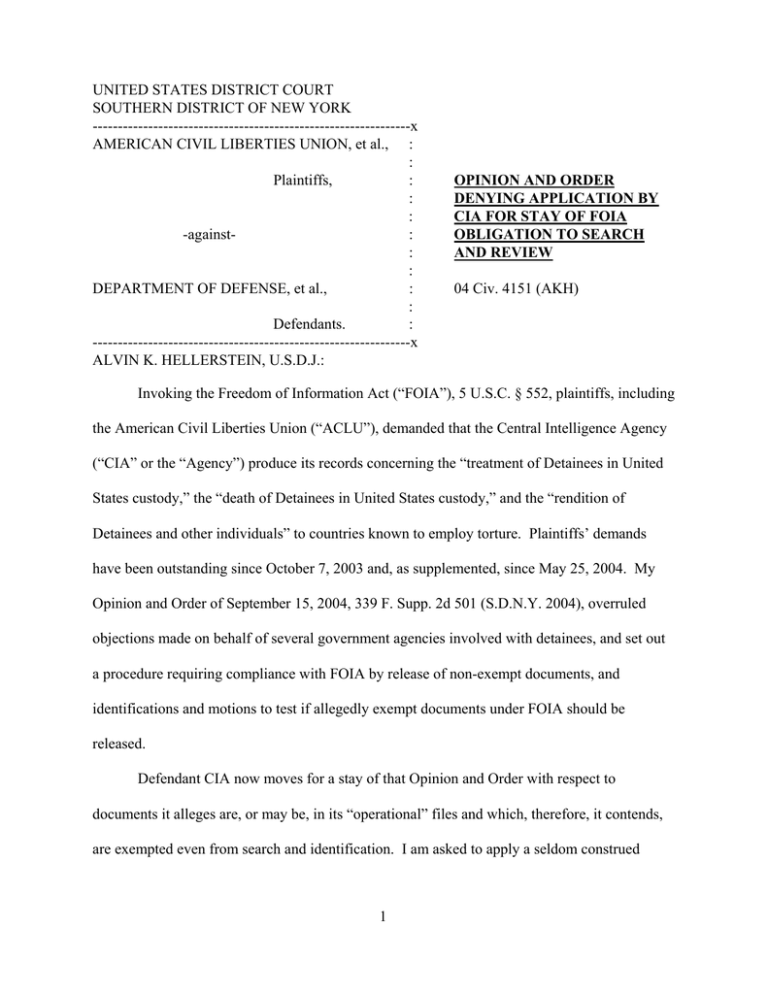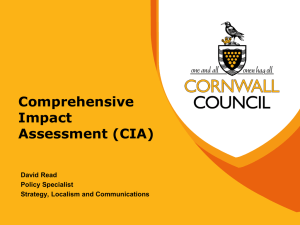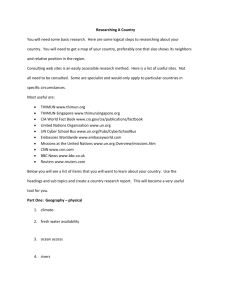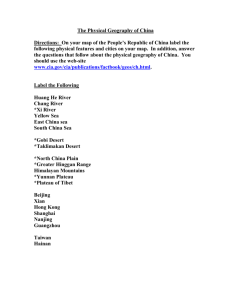UNITED STATES DISTRICT COURT SOUTHERN DISTRICT OF NEW YORK ---------------------------------------------------------------x
advertisement

UNITED STATES DISTRICT COURT SOUTHERN DISTRICT OF NEW YORK ---------------------------------------------------------------x AMERICAN CIVIL LIBERTIES UNION, et al., : : Plaintiffs, : : : -against: : : DEPARTMENT OF DEFENSE, et al., : : Defendants. : ---------------------------------------------------------------x ALVIN K. HELLERSTEIN, U.S.D.J.: OPINION AND ORDER DENYING APPLICATION BY CIA FOR STAY OF FOIA OBLIGATION TO SEARCH AND REVIEW 04 Civ. 4151 (AKH) Invoking the Freedom of Information Act (“FOIA”), 5 U.S.C. § 552, plaintiffs, including the American Civil Liberties Union (“ACLU”), demanded that the Central Intelligence Agency (“CIA” or the “Agency”) produce its records concerning the “treatment of Detainees in United States custody,” the “death of Detainees in United States custody,” and the “rendition of Detainees and other individuals” to countries known to employ torture. Plaintiffs’ demands have been outstanding since October 7, 2003 and, as supplemented, since May 25, 2004. My Opinion and Order of September 15, 2004, 339 F. Supp. 2d 501 (S.D.N.Y. 2004), overruled objections made on behalf of several government agencies involved with detainees, and set out a procedure requiring compliance with FOIA by release of non-exempt documents, and identifications and motions to test if allegedly exempt documents under FOIA should be released. Defendant CIA now moves for a stay of that Opinion and Order with respect to documents it alleges are, or may be, in its “operational” files and which, therefore, it contends, are exempted even from search and identification. I am asked to apply a seldom construed 1 statute: the CIA Information Act (the “Act”), which both authorizes the “Director of the Central Intelligence Agency, with the coordination of the Director of National Intelligence,”1 to exempt the CIA’s “operational files” from “publication or disclosure” under the Freedom of Information Act, “or search or review in connection therewith,” see 50 U.S.C. § 431(a); and also provides an exception to that exemption where an “impropriety, or violation of law, Executive order, or Presidential directive, in the conduct of an intelligence activity” is being investigated by the congressional intelligence committees, various agencies of government, or the “Office of Inspector General of the Central Intelligence Agency.” See id. § 431(c)(3). The exception provides that otherwise exempted operational files nonetheless “shall continue to be subject to search and review for information concerning…the specific subject matter of [such] investigation,” id., subject, of course, to proof that documents identified as responsive in such a search nevertheless may not be released to the public because they are exempt under a specific FOIA exemption. I hold that defendant CIA has failed to satisfy the statutory prerequisites for invoking the operational files exemption, and hence may not avoid the requirements imposed by FOIA, as defined by my Opinion and Order of September 15, 2004. As I ordered, where identification of a responsive document may itself compromise security, in camera identifications may be used. I hold, also, that the investigation being carried out by the Office of Inspector General of the CIA requires the CIA to search for, and either release or claim exemption against release of, the 1 The recently enacted Intelligence Reform and Terrorism Prevention Act of 2004, Pub. L. No. 108-458, 118 Stat. 3638 (Dec. 17, 2004) (effective not later than six months after enactment, as provided by section 1097 of such Act), establishes a Director of National Intelligence and amends 50 U.S.C. § 431 to include a role for that director. Accordingly, in this Opinion and Order I refer to the amended text of 50 U.S.C. § 431 despite the fact that the parties’ briefs and the discussions at oral argument, held December 20, 2004, referred to the superseded text. 2 records responsive to plaintiffs’ FOIA requests that have been produced or gathered pursuant to the investigation. I. Background Plaintiffs made their first FOIA request for the records described above on October 7, 2003. Def.’s Br., at 4. On October 27, 2003, the CIA denied this request, claiming exemption under the CIA Information Act. Id. at 4-5. Plaintiffs appealed and the CIA denied the appeal on May 13, 2004 with respect to operational files. Id. at 5. With respect to non-operational files, the CIA located thirteen documents responsive to plaintiffs’ request, which it proceeded to withhold under FOIA exemptions (b)(1) and (b)(3). Id. On May 25, 2004, plaintiffs submitted a second FOIA request, nearly identical to the first,2 in which they reiterated their first request as supplemented by additional records that may have been generated or obtained since the first request of October 7, 2003. Id.; Pls.’ Br., at 4. According to plaintiffs, the CIA provided “no substantive responses” in its July 29, 2004 letter addressing the second request. Pls.’ Br., at 3. Meanwhile, on May 11, 2004, the CIA’s Office of Inspector General (the “OIG”) “commenced a criminal investigation of allegations of impropriety in Iraq.” Def.’s Br., at 5; see also Decl. of Mona B. Alderson, CIA Assistant Inspector General for Investigations, dated Nov. 9, 2004, at ¶ 5; Decl. of Scott A. Koch, CIA Information and Privacy Coordinator, dated Oct. 15, 2004, at ¶ 21. The CIA has been extremely sparing in the details it has supplied about the nature of this investigation. For example, in its brief, the CIA notes that 2 Plaintiffs’ second request differs immaterially from the first: “Records concerning the treatment of Detainees in United States custody; (b) Records concerning the deaths of Detainees in United States custody; and (c) Records related to the rendition of Detainees and other individuals to foreign powers known to employ torture or illegal interrogation techniques.” See Decl. of Lawrence S. Lustberg, dated July 6, 2004, Ex. 13 (Letter from Lustberg, et al., to Robert T. Herman, Information and Privacy Coordinator, CIA, of May 25, 2004, at 1). 3 [a]lthough the Iraq investigation is referred to in the singular in this memorandum of law, there may be several investigations that are related to or grow out of the general Iraq investigation. In addition, the OIG is conducting other criminal investigations the specific subject matter of which may overlap with the subject matter of plaintiffs’ FOIA requests. Def.’s Br., at 2 n.1. The investigation is ongoing, and requires the OIG to probe the conduct of CIA components and personnel. Id. at 5; see also Alderson Decl. ¶ 5; Koch Decl. ¶ 21. The CIA states that in the course of the investigation thus far, “the OIG has searched for and received documents, including documents from the [CIA’s] operational files.” Def.’s Br., at 56. These documents are held in the OIG’s investigative files, which also contain documents created by OIG. Id. at 6 n.3. II. Standard of Review The parties did not brief the question whether the Agency’s interpretation of the CIA Information Act is entitled to any deference under Chevron U.S.A., Inc. v. Natural Res. Def. Council, Inc., 467 U.S. 837 (1984). In the present case, there has been no apparent articulation of the position now advocated by defendant CIA prior to the commencement of this lawsuit. See In re New Times Sec. Serv., Inc., 371 F.3d 68, 80-81 (2d Cir. 2004) (finding Chevron deference inappropriate in part because “it appears that the position taken by the SEC in its [amicus] brief is one that it has not previously articulated in any form”); see also In re Enter. Mortg. Acceptance Co., LLC, Sec. Litig., 391 F.3d 401, 410 n.8 (2d Cir. 2004) (remarking that “because the SEC’s position is put forth only in an amicus brief, it lacks the force of law and thus does not warrant Chevron deference” (citing In re New Times Sec. Serv., Inc.) (internal quotations omitted)). The CIA provided three written responses to plaintiffs’ FOIA requests: two in response to plaintiffs’ direct requests; one responding to plaintiffs’ administrative appeal. Although the Agency cited generally therein to the CIA Information Act’s provisions regarding 4 operational files, it nowhere espoused the basis that it now, through counsel, puts forward. See Decl. of Sean H. Lane, Assistant United States Attorney, dated July 30, 2004, Exs. M, N, & O (attaching copies of correspondence). Nor do the regulations cited in the Agency’s responses to plaintiffs set forth this position. See 32 C.F.R. pt. 1900 (Public Access to CIA Records Under the Freedom of Information Act (FOIA)). “The fact that Chevron is inapplicable to this case does not mean that the [Agency’s] interpretation will merit no deference whatsoever.” In re New Times Sec. Serv., Inc., 371 F.3d at 82-83. Rather, “it warrants the more limited standard of deference adopted by the Supreme Court in Skidmore v. Swift & Co., 323 U.S. 134 [(1944)].” Id. at 83 (citing United States v. Mead Corp., 533 U.S. 218, 234 (2001)). As the Second Circuit has interpreted, “the level of deference owed to any particular interpretation depends upon ‘the thoroughness evident in its consideration, the validity of its reasoning, its consistency with earlier and later pronouncements, and all those factors which give it power to persuade, if lacking power to control.’” Id. (quoting Skidmore, 323 U.S. at 140, and citing Mead, 533 U.S. at 239). The Second Circuit has “outlined the factors that inform our Skidmore analysis, including ‘the agency’s expertise, the care it took in reaching its conclusions, the formality with which it promulgates its interpretations, the consistency of its views over time, and the ultimate persuasiveness of its arguments.’” Id. (quoting Cmty. Health Ctr. v. Wilson-Coker, 311 F.3d 132, 138 (2d Cir. 2002)). On the record before me, I decline to address the CIA’s position in the present motion with formal Skidmore deference, as I am not able adequately to address these factors except for the “persuasiveness of [the CIA’s] arguments,” a factor that I take into consideration in any 5 event. Accordingly, I review the Agency’s statutory interpretation, as reflected in its motion, de novo. III. Freedom of Information Act and CIA Information Act A. The Statutory Texts Originally enacted in 1966, the Freedom of Information Act “is often explained as a means for citizens to know what the Government is up to.” National Archives and Records Admin. v. Favish, 541 U.S. 157, ----, 124 S. Ct. 1570, 1580 (2004) (internal quotations omitted). In brief, FOIA commands each agency to make certain information available to the public through a variety of means, including publication in the Federal Register, see 5 U.S.C. § 552(a)(1), public inspection, see id. § 552(a)(2), and requests for records, see id. § 552(a)(3). These requirements do not apply, however, to certain categories of records, which may be withheld, among other reasons, in the interests of national defense or law enforcement proceedings, or pursuant to statutory exemption: (b) This section does not apply to matters that are— (1) (A) specifically authorized under criteria established by an Executive order to be kept secret in the interest of national defense or foreign policy and (B) are in fact properly classified pursuant to such Executive order; .... (3) specifically exempted from disclosure by statute (other than section 552b of this title), provided that such statute (A) requires that the matters be withheld from the public in such a manner as to leave no discretion on the issue, or (B) establishes particular criteria for withholding or refers to particular types of matters to be withheld; .... (7) records or information compiled for law enforcement purposes, but only to the extent that the production of such law enforcement records or information (A) could reasonably be expected to interfere with enforcement proceedings, (B) would deprive a person of a right to a fair trial or an impartial adjudication, (C) could reasonably be expected to constitute an unwarranted invasion of personal privacy, (D) could reasonably be expected to disclose the identity of a 6 confidential source, including a State, local, or foreign agency or authority or any private institution which furnished information on a confidential basis, and, in the case of a record or information compiled by criminal law enforcement authority in the course of a criminal investigation or by an agency conducting a lawful national security intelligence investigation, information furnished by a confidential source, (E) would disclose techniques and procedures for law enforcement investigations or prosecutions, or would disclose guidelines for law enforcement investigations or prosecutions if such disclosure could reasonably be expected to risk circumvention of the law, or (F) could reasonably be expected to endanger the life or physical safety of any individual. Id. § 552(b). The CIA Information Act, which significantly modifies the way in which FOIA applies to the Agency, was enacted in 1984 and added a new title to the National Security Act of 1947, codified at 50 U.S.C. § 401 et seq., the statute that created the CIA. The CIA Information Act authorizes the head of the Agency to exempt operational files from the purview of FOIA. “The Director of the Central Intelligence Agency, with the coordination of the Director of National Intelligence, may exempt operational files of the Central Intelligence Agency from the provisions of section 552 of title 5, United States Code (Freedom of Information Act), which require publication or disclosure, or search or review in connection therewith.” 50 U.S.C. § 431(a). Operational files are in turn defined to include certain files of the Directorate of Operations, the Directorate for Science and Technology, and the Office of Personnel Security that contain sensitive information about CIA methods: (b) “Operational files” defined. In this section, the term “operational files” means-(1) files of the Directorate of Operations which document the conduct of foreign intelligence or counterintelligence operations or intelligence or security liaison arrangements or information exchanges with foreign governments or their intelligence or security services; 7 (2) files of the Directorate for Science and Technology which document the means by which foreign intelligence or counterintelligence is collected through scientific and technical systems; and (3) files of the Office of Personnel Security which document investigations conducted to determine the suitability of potential foreign intelligence or counterintelligence sources; except that files which are the sole repository of disseminated intelligence are not operational files. Id. § 431(b). After authorizing a general exemption for operational files from FOIA search and review requirements, however, the CIA Information Act proceeds to carve out three exceptions to this exemption. See Hunt v. C.I.A., 981 F.2d 1116, 1121 (9th Cir. 1992) (stating that the “CIA Information Act provided a blanket exemption from FOIA requirements for most CIA operational files”).3 Files gathered pursuant to one of these three exceptions remain subject to FOIA’s search and review directives—searches by individuals for information about themselves, searches relating to special activities, or searches relating to investigations of improper or illegal conduct. The last is at issue in the present case. (c) Search and review for information. Notwithstanding subsection (a) of this section, exempted operational files shall continue to be subject to search and review for information concerning-.... (3) the specific subject matter of an investigation by the congressional intelligence committees, the Intelligence Oversight Board, the Department of Justice, the Office of General Counsel of the Central Intelligence Agency, the Office of Inspector General of the Central Intelligence Agency, or the Office of the Director of National Intelligence for any impropriety, or violation of law, Executive order, or Presidential directive, in the conduct of an intelligence activity. 3 In its brief, the CIA quotes a Supreme Court statement that with this statute, “Congress exempted the Agency’s ‘operational files’ from disclosure under the FOIA,” CIA v. Sims, 471 U.S. 159, 174 n.19 (1985); this comment, however, was made in a very brief footnote that did not purport to provide substantive analysis of the Act or the exceptions in section 431(c). 8 50 U.S.C. § 431(c)(3). Defendant CIA argues that the exemption for operational files entitles it to postpone its search and review for various reasons relating to the indefinite scope of the investigation undertaken by the OIG, and that the exception pertaining to investigations, section 431(c)(3), does not apply until such time as the Iraq investigation has concluded. B. Discussion Regarding the Statutory Texts The CIA Information Act does not grant the CIA an automatic exemption of its operational files from the records it must search in response to a FOIA demand. Rather, the statute requires the Director of the CIA explicitly to claim an exemption with respect to specifically categorized files in order for the Agency to take advantage of the protections afforded by section 431(a). To date, defendant CIA has submitted no evidence that the Director declared such an exemption. See Tr. of Dec. 20, 2004, at 20-23. The Act does not provide for delegated authority to invoke the exemption.4 In the absence of adherence by the CIA to the statutory procedure for exempting operational files, I decline to find that its operational files warrant any protection from the requirements of FOIA. The CIA’s application for a stay of its obligation to comply with the requirements of FOIA, including “publication or disclosure, or search or review in connection therewith,” 50 U.S.C. § 431(a), with respect to its operational files, is denied. Even assuming, however, that the operational files had been properly exempted from the purview of FOIA, the CIA has failed to articulate a viable reason why, under the plain language 4 The privilege for state secrets also requires the head of an agency to invoke the privilege. See United States v. Reynolds, 345 U.S. 1, 7-8 (1953); Zuckerbraun v. Gen. Dynamics Corp., 935 F.2d 544, 546-47 (2d Cir. 1991); 3 Joseph M. McLaughlin et al., Weinstein’s Federal Evidence § 509.40[2] (2d ed. 2004). 9 of the statute, they should not once again become subject to FOIA under the exception in 50 U.S.C. § 431(c)(3), at least to the extent documents have been produced or gathered pursuant to the investigation. Section 431(c)(3) is applicable when “information” is sought “concerning,” which is a broadly inclusive term, see Tr. of Dec. 20, 2004, at 39, the “specific subject matter of an investigation” by “the Office of Inspector General” into “any impropriety” or illegality “in the conduct of an intelligence activity.” Defendant concedes that “[i]n this case, the OIG has begun an investigation into improprieties in Iraq, thereby triggering § 431(c)(3)’s exception to the Act.” Def.’s Br., at 3. The exception therefore applies. Moreover, the CIA has already performed a search of its operational files. For example, the CIA states that “[i]n the course of its investigations so far, the OIG has searched for and received documents, including documents from the operational files of the CIA.” Id. at 5-6. And further, “[t]hese documents are maintained in OIG investigative files, which also include documents created by the OIG. The OIG’s files may include documents responsive to plaintiffs’ request.” Id. at 6 n.3. There can be no additional material burden in searching and reviewing the documents already in the OIG’s files that are also responsive to plaintiffs’ FOIA requests. Defendant argues, however, that the exception provided in section 431(c)(3) is not triggered until the conclusion of the relevant investigation, effectively delaying the CIA’s renewed obligation under section 431(c)(3) to comply with FOIA until such time, if ever. Id. at 7. The plain text of the CIA Information Act itself does not so provide, see 50 U.S.C. § 431(c)(3), and defendant so concedes. Def.’s Br., at 9. Accordingly, I decline to interpret the statute to incorporate an indefinite and ambiguous exception to its applicability. Defendant argues, nevertheless, that under the facts of this case, the pertinent files cannot be searched until the conclusion of the investigation. Id. at 16. No circumstance has 10 been advanced, however, to justify a delay of the Agency’s obligations. Defendant CIA has argued that it has no staff that may appropriately conduct a FOIA search at this time because on the one hand, OIG staff must attend to the underlying investigation, and on the other hand, CIA components “do not know the specific subject matter of the Iraq investigation,” and informing them would threaten the integrity of the OIG’s internal investigation. Id., at 16-17 (quoting Alderson Decl. ¶ 7). These administrative concerns, likely to arise whenever operations are investigated, reflect a reluctance on the part of the CIA to comply with section 431(c)(3). The CIA’s reluctance to comply with FOIA is not a lawful excuse. C. Legislative History Prior to the passage of the CIA Information Act, FOIA applied to the CIA in the same way as it did to other federal agencies. H.R. Rep. No. 98-726, pt. 1, at 4 (1984). Enacted in October of 1984, the CIA Information Act was the product of a long-term effort to tailor the application of FOIA to the CIA in a way that eliminated the “unproductive process of searching and reviewing CIA operational records systems which contain little, if any, information releasable under FOIA [and] absorbs a substantial amount of the time of experienced CIA operational personnel and scarce tax dollars.” Id. at 5. One effect was that the CIA had accumulated a two-to-three year backlog in the processing of incoming FOIA requests. Id. Congress determined that this “expenditure of time and money on fruitless search and review of sensitive operational records contributes nothing to the FOIA goal of releasing non-exempt information to the public.” Id. One of the hopes expressed was that with the passage of the CIA Information Act, unproductive searches of the Agency’s sensitive operational files would be “redirected to productive processing of FOIA requests for records in other files, which contain releasable information.” Id. at 6. The legislative history of the Act thus reflects a dual 11 purpose. First, the Act was intended to curb wasteful searches of material that was likely ultimately to be withheld; second, the Act was intended to expedite searches that Congress deemed more productive. Although much of the legislative history is dedicated to describing the sweeping nature of the exemption of operational files from FOIA searches, it also provides explanations for exceptions that were created. For example, if records were transferred from operational (exempted) files to other files and then transferred back, the exemption covering the operational files could no longer protect those records from being identified for release or specific exemption under FOIA. Records from exempted operational files which have been disseminated to and referenced in files that are not exempted under subsection (a) of this section and which have been returned to exempted operational files for sole retention shall be subject to search and review. 50 U.S.C. § 431(d)(3). The legislative history explains that this paragraph “concerns the CIA practice of using marker references, referred to as ‘dummy copies,’ in the dissemination of particularly sensitive records from operational files.” H.R. Rep. No. 98-726, pt. 1, at 32. In these circumstances, the sensitive record is temporarily removed, shown to an intended recipient, and returned to the operational file for exclusive storage; in addition, a marker reference, typically a piece of paper with a brief description of the subject matter and storage site of the sensitive record, is put in the file of the reader. Id. The legislative history explains that section 431(d)(3) ensures that “when CIA is searching a non-exempted file for records responsive to an FOIA request and locates a marker reference which substitutes for a record in an exempted operational file which may be responsive, the CIA must retrieve the record from the exempted operational file and process it in response to the FOIA request.” Id. Thus, even “particularly sensitive records,” by virtue of having been disseminated or identified beyond their 12 originating operational files, become subject to FOIA search and review, subject always to later proof of specifically available FOIA exemption. Likewise in this case, there is no insuperable administrative inconvenience that can excuse the CIA from the normal obligation to search and review requested documents. The CIA, we are told, searched its files in the course of its Inspector General’s investigation into allegations of impropriety in Iraq. Accordingly, the burden on the CIA to search and review in response to plaintiffs’ FOIA requests is much reduced, for the search has already been made. The policy behind FOIA—the “general philosophy of full agency disclosure,” U.S. Dept. of Justice v. Reporters Committee for Freedom of the Press, 489 U.S. 749, 754 (1989)—coheres with another concern of the CIA Information Act, “the comparable public interest in investigations of allegedly illegal or improper intelligence activities.” S. Rep. No. 98-305, at 15 (1983). Defendant argues that the exception requiring search and review of responsive operational records in investigative files should not arise until after investigations are completed and their scope is clearly defined. Here, defendants argue, the investigation is not completed, and its scope has not been conclusively defined. Defendant’s contentions are based, not on section 431(c)(3), but on defendant’s view of the legislative history. However, the specific legislative history that addresses the investigation exception, 50 U.S.C. § 431(c)(3), does not support defendant’s argument. 1. Whether the Investigation Must Have Concluded. During the testimony before the Senate Select Committee on Intelligence, John N. McMahon, Deputy Director of Central Intelligence, raised the issue “how it would be possible for the American public to have access to information concerning any Agency intelligence 13 activity that was improper or illegal.” S. 1324, An Amendment to the National Security Act of 1947: Hearings Before the Senate Select Comm. on Intelligence, 98th Cong. 15 (1983) [hereinafter Senate Hearings]. McMahon testified that should an investigation be launched by, among others, the Inspector General’s office, “of any alleged impropriety or illegality and it is found that these allegations are not frivolous, records of such an investigation will be found in non-designated [i.e., non-exempted] files.” Id. And further, “[i]n such a case, information relevant to the subject matter of the investigation would be subject to search and review in response to an FOIA request because this information would be contained in files belonging to the Inspector General’s office, for example, and these files cannot be designated [as exempt from FOIA] under the terms of this bill.” Id. When he was asked by Senator Barry Goldwater, chairman of the committee: “If designated files contain information concerning possible illegal intelligence activities…would they be exempt from search and review under this bill?” McMahon answered: “No, they would not. The mere process of that illegal action coming up through the process would place that information into nondesignated [i.e., nonexempted] files which would mean that they would be susceptible to search and review.” Id. at 29. These remarks, made by a senior official from the CIA, concerned S. 1324, a precursor bill that had an earlier version of the investigation exception. The Senate Hearings, in which the comments were made, nonetheless bear on the present inquiry because the inclusion of a spelled-out investigation exception, added later than the other two exceptions provided by section 431(c), was the product of these hearings. See S. Rep. No. 98-305, at 25-26 (describing amendment of bill as introduced); Karen A. Winchester & James W. Zirkle, Freedom of Information and the CIA Information Act, 21 U. Rich. L. Rev. 231, 267 (1987) [hereinafter 14 Winchester & Zirkle] (“The third exception differs from the previous two exceptions in that it was not contained in the original version of the legislation considered in the 98th Congress, i.e., S. 1324 as introduced.”). Simply stated in the Senate Committee’s Report accompanying the final version of S. 1324, “[i]nternal CIA investigations will be conducted by Agency components whose files cannot be designated [i.e., exempted] under this bill.” S. Rep. No. 98305, at 26. These comments reflect the Senate Committee’s concern that information gathered in an investigation could be strategically placed by the CIA in exempted operational files; the inclusion of a specific investigation exception was meant to make relevance, not storage site, the touchstone of public access. See id. at 25-26. The statements of Senators and Representatives involved in the enactment of the CIA Information Act use both the present, and past, tenses concerning material in the investigative files that are held to be subject to search and review under FOIA. The statements are collected below. No substantive intent can fairly be gleaned from the tense used by a legislator in his comments on the Act’s investigation exception. For statements in the present tense in connection with H.R. 5164, the bill that was ultimately enacted into law, see 130 Cong. Rec. S27789 (daily ed. Sept. 28, 1984) (statement of Sen. Leahy, member of the Senate Select Committee on Intelligence) (recommending passage in part because the Act will “permit continued search and review of matters which are the subject of official investigations for illegality or impropriety”); see also id., at H25543 (daily ed. Sept. 17, 1984) (statement of Rep. Kindness) (favoring passage and remarking that “the clear wording of the bill points out that nothing would preclude or prohibit the inquiry by the court into the subject matter that is the subject for search and review if that is a specific subject matter of an 15 investigation”); id., at H25539-40 (statement of Rep. Boland) (favoring passage and noting in attachment that certain information formerly obtainable under a FOIA request would still be so because, in the present perfect, “the issue has been the subject of both CIA and congressional investigations”). For statements about H.R. 5164 using the past tense, see H.R. Rep. No. 98-726, pt. 2, at 6 (1984) (stating that still subject to FOIA is “[i]nformation concerning any Agency intelligence activity that was improper or illegal or that was the subject of an investigation for alleged illegality or impropriety”). Variant tenses can also be found. See H.R. Rep. No. 98-726, pt. 1, at 30-31 (“Information concerning the specific matter of the investigation will remain subject to search and review regardless of whether those conducting the investigation reviewed records containing that information in the course of the investigation. The key requirement is that information concern the specific subject matter of the investigation, not that the information surfaced in the course of the investigation.”). The varying tenses of legislative speech provide an uncertain basis to argue substantive result. Congress provided an exception to require the CIA to search investigative files for documents moved there from exempted operational files. That is what is at stake in the case before me. The requirement to search and review does not turn on whether the investigation continues, or has ended. 2. The Scope of the Investigation Exception. The Senate’s proposed investigation exception, which, after modification by the House, became enacted as section 431(c)(3), would have required the CIA to search and review “for information reviewed and relied upon in an investigation.” See S. 1324, 98th Cong. (1983). A 16 representative of the ACLU testified before the House Intelligence Committee as to his preference for a House bill that proposed that the exception be defined as information that concerned “the subject of an investigation,” H.R. 3460, 98th Cong. (1983). His concern, he stated, was that information could be overlooked, and yet be relevant to the investigation and responsive to a FOIA request. Now, the difference is that if an investigator happens to overlook a document, he has not reviewed or relied upon it, and it would not be covered by the Senate bill [S. 1324], whereas the Mazzoli bill [H.R. 3460] will cover all documents which concern the subject of the investigation, irrespective of whether it has been actually looked at or overlooked through inadvertence or whatever other reason. Legislation to Modify the Application of the Freedom of Information Act to the Central Intelligence Agency: Hearing Before the Subcomm. on Legislation of the House Permanent Select Comm. on Intelligence, 98th Cong., 2d Sess. 49 (1984) [hereinafter House Intelligence Comm. Hearing] (statement of Mark Lynch). Representative Mazzoli criticized both extremes; “‘relied upon’ may be too narrow,” he said, but “‘concerning the subject’ is as broad as the universe.” House Intelligence Comm. Hearing, at 58 (statement of Rep. Mazzoli). The Committee sought to craft the investigation exception “to include any information that might have been overlooked and yet preclude an expansive interpretation as to which exempted operational files would have to be searched and reviewed under the exception.” Winchester & Zirkle, at 272. The current formulation was the result, requiring search and review “for information concerning…the specific subject matter of an investigation.” 50 U.S.C. § 431(c)(3). As the House Intelligence Committee Report accompanying H.R. 5164, the bill enacted, stated: The specificity requirement in the phrase ‘specific subject matter of the investigation’ tailors the scope of information remaining subject to the FOIA process to the scope of the specific subject matter of the investigation. This tailoring was intended to avoid the possibility of an unreasonably expansive interpretation of 17 paragraph 701(c)(3) [50 U.S.C. § 431(c)(3)] to include as subject to search and review information wholly unrelated to any question of illegality or impropriety. H.R. Rep. No. 98-726, pt. 1, at 31. The legislative history reinforces the clearly expressed intent of section 431(c)(3) to require that the CIA search and review its information produced or gathered “concerning…the specific subject matter” of the investigation, for public release, or specific exemption, under FOIA. The documents in question need not actually have been reviewed and relied upon by the OIG staff, and the CIA may not delay compliance until such time, if ever, an investigation is closed. Defendant’s cavil that the review in an ongoing investigation “would have to be conducted by the investigative personnel themselves,” and that “non-investigators would then have to re-review the operational files after the investigation was completed to make sure the investigators did not miss anything,” Def.’s Br., at 12, misinterprets the legislative history. The argument lacks merit. Congress has set the laws, and it is the duty of executive agencies to comply with them, assigning appropriate officers and employees to perform such compliance. Defendant next argues that the investigation of the CIA’s Inspector General into “allegations of impropriety in Iraq” is insufficiently defined to qualify under the exception. The CIA cites Sullivan v. CIA, 992 F.2d 1249 (1st Cir. 1993). In Sullivan, the plaintiff’s father was last seen departing in a twin-engine plane from Mexico in 1963, and had not been heard from since, a span of almost thirty years. Based on her own research, the plaintiff believed that her father had been engaged in a “CIA-sponsored mission to drop propaganda (or perhaps something more sinister) over Cuba,” id. at 1251, and made demand under FOIA that the CIA produce records relating to her father. In response, the CIA searched its non-operational files, but refused to search its operational files. Id. Plaintiff filed suit, contending that, under section 431(c)(3), the CIA was required to search because a 18 Senate Select Committee (the Church Committee) was investigating “certain covert operations against Cuba mounted by the CIA and other (putatively independent) anti-Castro groups.” Id. at 1254. The Court of Appeals held, however, that the broad investigation of the Senate Select Committee could not be said to overlap with the specific subject matter of plaintiff’s FOIA request. [A] pivotal requirement of section 431(c)(3) is that, to be extractable, the information requested must concern the specific subject matter of the official investigation. Thus, although there were instances in which the Committee searched for agency misconduct, that happenstance does not allow appellant to catapult herself over the statutory parapet. It is simply not enough that information which bore in some remote way on the request surfaced in the course of an official investigation. Id. at 1255. The Court of Appeals noted that the Senate Select Committee’s focus was to examine “the relationship, if any, between the assassination of President Kennedy…and American-sponsored operations against Cuba.” Id. In addition to there being no overlap with plaintiff’s FOIA request, there also was not “a direct investigation [by the Committee, as section 431(c)(3) requires,] into CIA wrongdoing.” Id. As the statute’s language and legislative history make clear, a congressional investigation that touches on CIA conduct in a particular incident or region, standing alone, is not sufficient to warrant the release of all CIA documents anent that incident or region. Instead, the congressional investigation and the documents sought must specifically relate to CIA wrongdoing, that is, some “impropriety” or “violation of law” in the conduct of the designated intelligence activity. The primary mission of the Church Committee, as appellant admits, was to examine the relationship, if any, between the assassination of President Kennedy, on the one hand, and American-sponsored operations against Cuba, on the second hand. In the course of its work, the Committee considered American operations against Castro and, inevitably, their legality. Seen from that perspective, the Committee's mission does not fit within the contours of section 431(c)(3) for two reasons. First, the Committee’s inquiry was not a direct investigation into CIA wrongdoing. Second, appellant’s request for information about her father’s disappearance bears no claimed or readily discernible relationship to the investigation’s purposes. Id. at 1254-55. 19 In contrast, defendant here concedes that “[i]n this case, the OIG has begun an investigation into improprieties in Iraq, thereby triggering § 431(c)(3)’s exception to the Act.” Def.’s Br., at 3. And, as defendant’s counsel answered my observation, Court: It seems to me that the government concedes that the CIA… – Inspector General of the CIA – has been investigating allegations of illegalities and improprieties with respect to CIA activities in Iraq. Answer: That’s correct, your Honor. Tr. of Dec. 20, 2004, at 2. Plaintiffs’ FOIA requests in this case are focused on these same questions of illegality— “the treatment of Detainees in United States custody,” their “death[s],” and their “rendition” to countries known to employ torture. The overlap between the specific subject matter of the Inspector General’s investigation and plaintiffs’ FOIA requests is patent. Sullivan v. CIA is distinguishable. I hold that Sullivan does not provide an excuse whereby the CIA may avoid the investigation exception of 50 U.S.C. § 431(c)(3). Conclusion For the reasons stated, I deny the CIA’s motion for a stay of its obligation to comply with my Opinion and Order of September 15, 2004. The CIA shall search and review in response to plaintiffs’ FOIA requests, as described in my Opinion and Order of September 15, 2004. If the parties cannot comply with the schedule for filing summary judgment papers heretofore ordered, they shall propose a revised schedule by joint letter to be submitted by February 12, 2005. SO ORDERED. Dated: New York, New York 20 February 2, 2005 ________________//S//_____________ ALVIN K. HELLERSTEIN United States District Judge 21






